PROGRAMME £2

Nikolai Gogol’s world is undoubtedly an odd one. His amusingly bizarre and grotesque depiction of small town officialdom in Tsarist Russia frequently resonates with our own world. His satirical cutting edge attacks any time or culture which sacrifices real values in favour of avarice and self advancement. The Russia of Pushkin, Lermontov and Nikolai Gogol was a sprawling, casteridden bureaucracy. The Civil Service had been classified into fourteen ranks and even the judiciary was part of the system, sharing its vices. The service drowned in paperwork and was ruled by fear. The enormity of Russia with its bitter winters and poor transport led to extremely isolated communities. They were ruled by local governors who became absolute in their power, behaving like mini tsars. Only the fear of the visiting government inspectors and the power they wielded kept the local mayors under state control. In 1825 the newly crowned Nicholas I easily crushed the first-ever national uprising against Tsarist rule. Consequently the disciplinarian Tsar increased oppression by the use of firm censorship and setting up a secret police force. Despite the rise of democracy throughout much of Europe at this time, feudalism in Russia remained strongly entrenched. Gogol was a minor member of the aristocracy. Born in 1809 in a small Ukraine town, at twenty he joined the Civil Service but despised it. Under the influence of the poet Pushkin he resigned after two years and began to write. His early works, ‘The Diary of a Madman’ and ‘The Nose’, had a powerful surrealistic quality with a sharp edge of satire. Gogol was briefly appointed Reader in World History at St Petersburg University but left shortly before the premiere of ‘The Government Inspector’ in April 1836. The theme was daring for its time, the story having been suggested by Pushkin who had once been mistaken for a high ranking official whilst staying in a small town. Stylistically the play was way ahead of its time with its mixture of satirical humour, absurdism and the grotesque. Furthermore, almost unknown at that time in Russian theatre, Gogol instituted regular rehearsals between the cast and the director! TSAR NICHOLAS I The principal role is that of Khlestakov, a penniless nonentity with a fantastic imagination. He is not a fraudster but an opportunist who seizes the chance of displaying his imaginary importance and capitalising from it. The other leading role is that of the Mayor who is inspired to appropriate whatever he desires. He is a small town tyrant but throughout the play is terrified of being ‘found out’. Perhaps amazingly the play was passed by the censor largely due to the intervention of the Tsar who had read it himself, was amused, and ordered it to be performed at The Imperial Theatre. The production was an instant popular success with liberal-minded spectators but was savagely attacked by right wing critics who plotted against Gogol. Unable to withstand the controversy, he left Russia and spent most of the remainder of his life restlessly roaming Europe, frequently returning to Rome. During the final ten years of his chosen exile, Gogol fell under the fanatical religious influence of archpriest Father Matthew. Pushkin had died, leaving Gogol with the feeling that the ethical leadership of Russian literature had fallen on his shoulders and he increasingly moralised in allegorical works. Suffering from extreme religious mania he burned the manuscript of the second volume of his masterpiece, ‘Dead Souls’. With his mind unbalanced by religious guilt, Gogol died in 1852 after severely weakening himself with self-imposed starvation. IAN NICHOLS Director of The Government Inspector
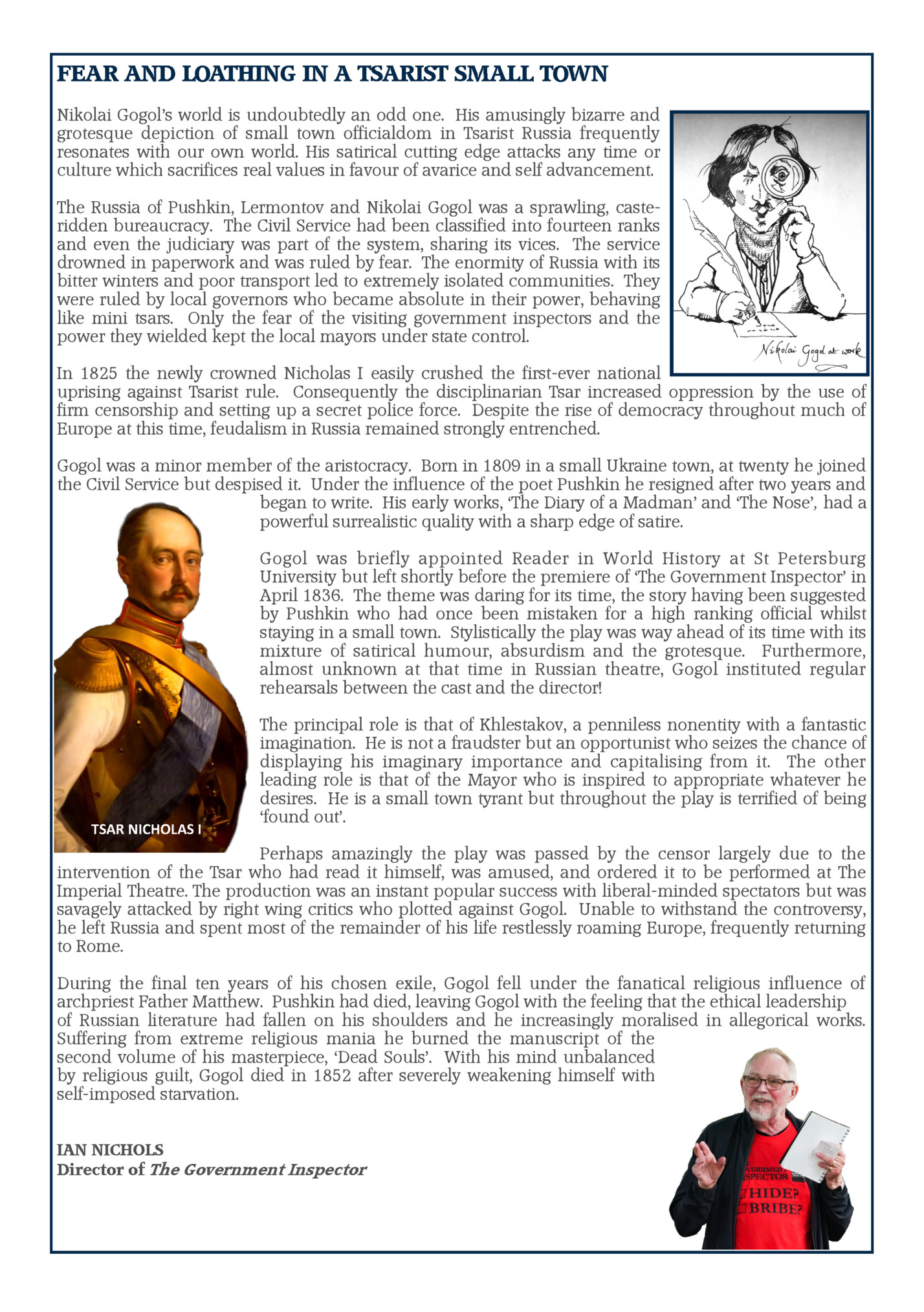
photos: Phill Griffith
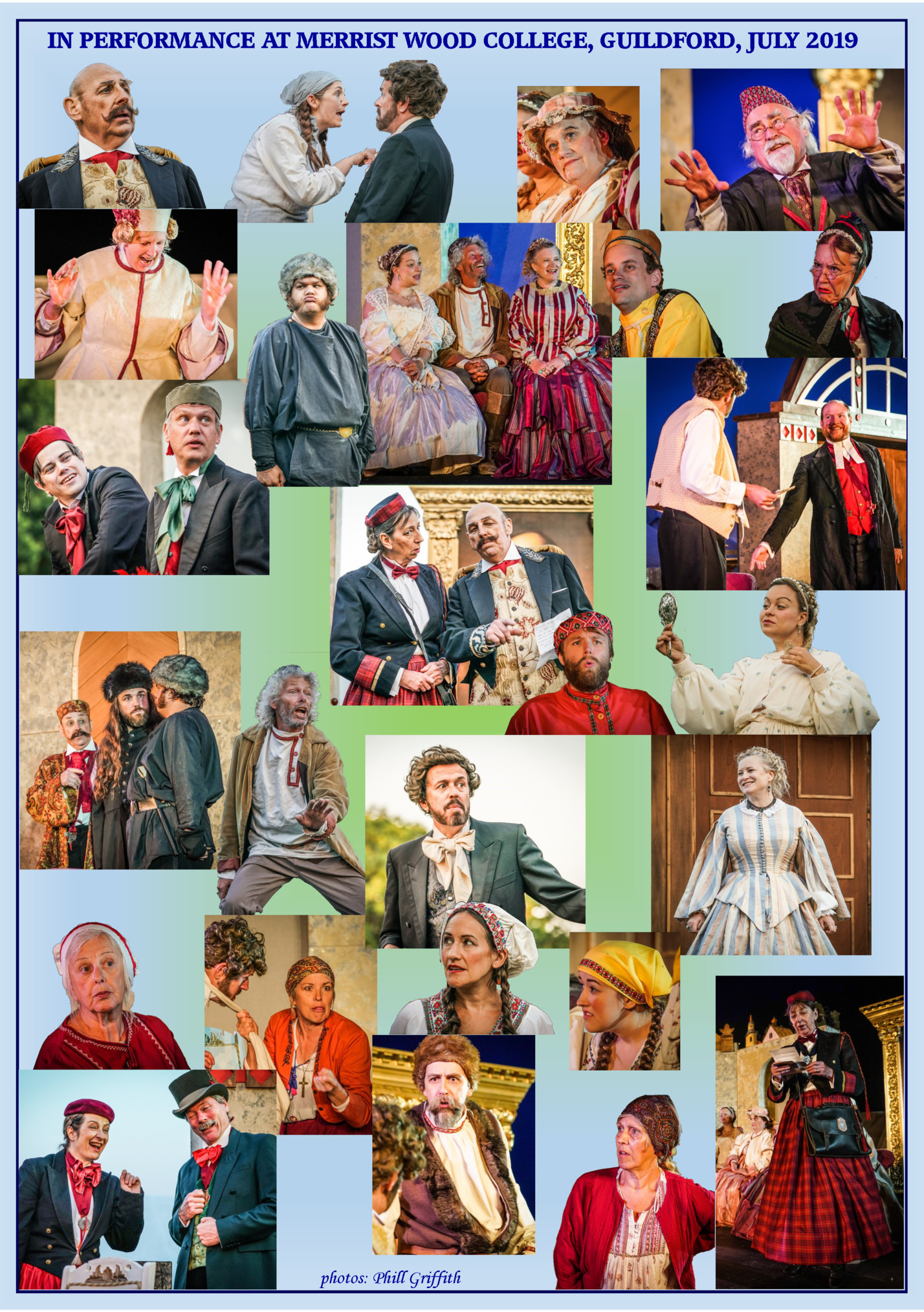
DIRECTOR IAN NICHOLS DESIGNERS IAN NICHOLS, GRAHAM RUSSELL-PRICE COSTUMIER DIANE NICHOLS ORIGINAL MUSIC ANDREW DONOVAN SOUND SIMON PRICE LIGHTING ROBERT SHEPPARD PRODUCTION MANAGER LAURA SHEPPARD STAGE MANAGER ROSEMARY CHAPMAN ASSISTANT STAGE MANAGER PAUL WAREHAM LIGHTING DESK KEVIN MALAM PROMPT CATHERINE SMART SET CONSTRUCTION GRAHAM RUSSELL-PRICE, MIKE DEAN MICHAEL BURNE, IAN PARKINSON PROPERTIES CHERYL MALAM PROGRAMME ROBERT SHEPPARD, IAN NICHOLS PUBLICITY GILLY FICK, STUART MORRISON TESSA DUGGLEBY, LAURA SHEPPARD GRAPHIC DESIGN PHILL GRIFFITH SEAMSTRESSES LIZZIE BURTON, ROSEMARY CHAPMAN JULIE JUDGE, MAGS PARKINSON, CATHERINE SMART, BARBARA TRESIDDER MILLINER PAM HEMELRYK MEDALS JEMMA JESSUP CASTING ASSISTANTS KATHRYN ATTWOOD, JONATHAN CONSTANT FRONT OF HOUSE DIANA DEAN TRANSPORT MANAGER STUART MORRISON FINANCE MANAGER MIKE DEAN GET-IN CO-ORDINATOR PETER BRODSHARP ST. PETERSBURG, EARLY 19TH CENTURY
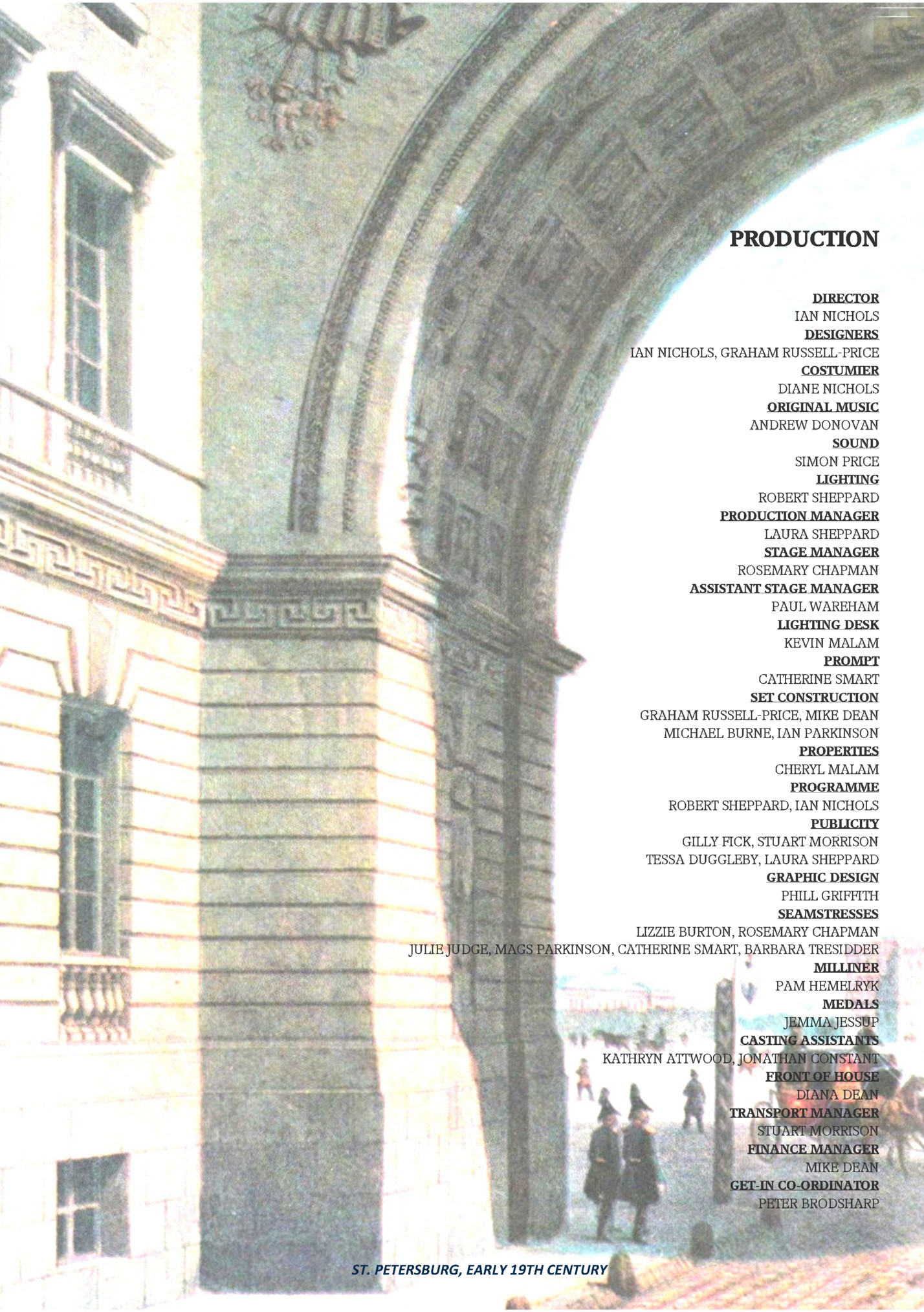
VISITORS KHLESTAKOV, a minor civil servant………………………………………………………JASON ORBAUM OSIP, his servant……………………………………………………………..…..…………. GRAHAM RUSSELL-PRICE DIGNITARIES and OFFICERS THE MAYOR, Anton Antonovich……………………………………………………….……...………...ROBERT SHEPPARD ANNA, his wife……………………………………………………………………………………….……..………………….LAURA SHEPPARD MARYA, their daughter…………………………………………………………………….……………………….………………..ISSY ARNETT MAGISTRATE, Lyapkin-Tyapkin…………………………………………………………………..……..……………………..TIM BROWN COMMISIONER FOR HEALTH, Zyemlyanika………………………….……………………………………...……….. GILLY FICK DR HÜBNER…………………………………………………………………………………………………………………...…………….……….DAVE UFTON DIRECTOR OF EDUCATION, Khlopov…………………………………………………...……………...…..HOWARD BENBROOK POSTMISTRESS, Shpyokin……………………………………………………………………….……………..………………..….DIANE NICHOLS SUPERINTENDENT……………………………………………………………………………………………….…………..………..STEFFEN ZSCHALER BOBCHINSKY, landowner……………………………………………………………………...………………………………...PAUL BAVERSTOCK DOBCHINSKY, landowner……………………………………………………………………...…………………………………….EDDIE WOOLRICH KOROBKIN, a dignitary…………………………………………………………………………..……………………………………….TESSA DUGGLEBY CONSTABLE/GENDARME…………………………………………………………………………...……………………………………………….OLI BRUCE MAYOR’S SERVANTS MISHKA…………………………………………………………………………………………………………….………………………………. JEMMA JESSUP AVDOTYA…………………………………………………………………………………………………………...…………………………….PAM HEMELRYK TOWNSFOLK WAITRESS……………………………………………………………………………………………………...………………………………………………..DEBBY DEAN POSHLYOKINA, locksmith’s wife……………………………………………………………...………………………………… CHERYL MALAM IVANOVA, sergeant’s widow…………………………………………………………………………………….………...ROSEMARY CHAPMAN ABDULIN, wine merchant………………………………………………………………………………….……………………….STUART MORRISON MAGISTRATE’S WIFE/SHOPKEEPER………………………………………………………….……………………. BARBARA TRESIDDER KHLOPOV’S WIFE/SHOPKEEPER…………………………………….……………………….…………………………………...TINA WAREHAM SHOPKEEPERS/ENSEMBLE……………………………………………………………………….…………………………………………...JEZ GOODING ROB GREAVES JAYA MORRISON
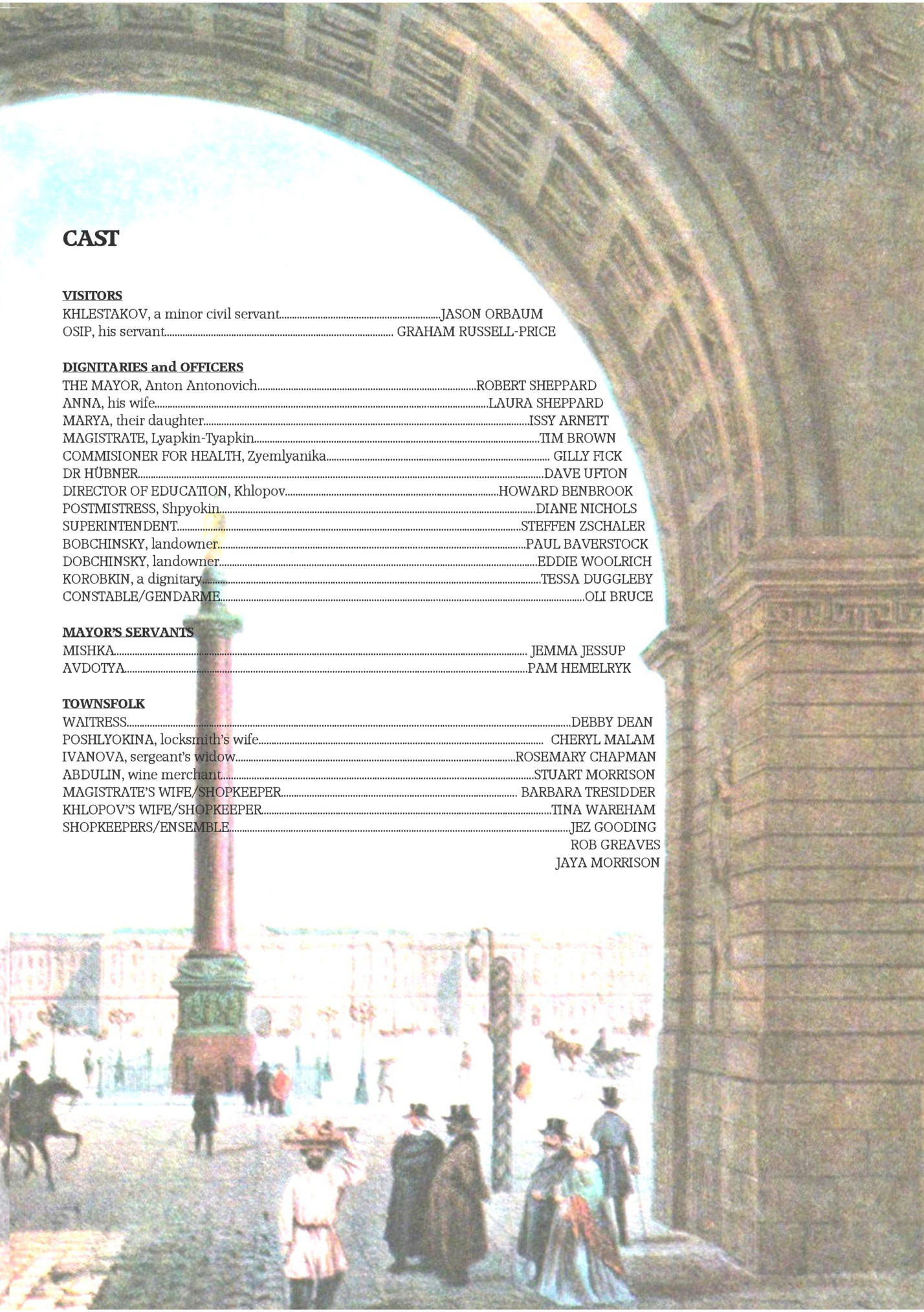
Beaton is a Scottish satirist, journalist, radio presenter, novelist, television writer and playwright. He translated and adapted this version of the play for The Chichester Festival Theatre in 2005. Although Tsarist bureaucracy was Gogol’s satirical target, The Government Inspector can bear more than one interpretation. In his introduction to the play Beaton says “It is an enduring classic precisely because it refuses to be labelled. It may reflect a society profoundly different from our own, but it still has plenty to say about how we live life today.” Beaton’s previous plays include Follow My Leader and a political satire Feelgood, which won The Evening Standard Award for Best Comedy 2001. His most recent play is Fracked: or Please Don’t Use The F-Word! (2016). His earlier 2016 short play, The Accidental Leader, prophetically (but not intentionally, according to Beaton) dealt with the mass resignation of shadow cabinet ministers from an opposition front bench led by a bearded, allotment-loving party leader! He is also the author of several best selling books and a number of television comedies including Drop the Dead Donkey, The Thatcher Papers, A Very Social Secretary (about David Blunkett’s affair), and previously was one of the founding members of Not the Nine O’Clock News as well as regularly writing for Spitting Image. In The Government Inspector I decided to gather together into one heap everything rotten in Russia as I saw it, all the injustices which are perpetrated where justice is most required of a man; I decided to hold everything up to ridicule at once. Nikolai Gogol I cannot permit that any individual should dare defy my wishes, once he knows what they are. Tsar Nicholas I Yes, we took, of course we took - who is not a sinner in the eyes of the Lord, who is not guilty before the Tsar? But tell me: is it better to accept no bribes and work badly? When you take a bribe, work becomes easier, more exciting. M E Saltykov, civil servant All the civil servants and officials can talk about is their department or government office; everything seems to have been crushed under a great weight, everyone is drowned by their trivial, meaningless labours. Gogol, to his mother GOGOL’S USE OF NAMES Similarly to Charles Dickens’s characters, Gogol’s also have ludicrous or revealing surnames. For example the Mayor’s name interprets as ‘Empty Headed Rascal’. The Magistrate’s means ‘Greedy Snapper’. Khlestakov’s is ‘Torrents of Fine Talk’. And the Police Superintendent’s name is ‘Whistle Blower’!
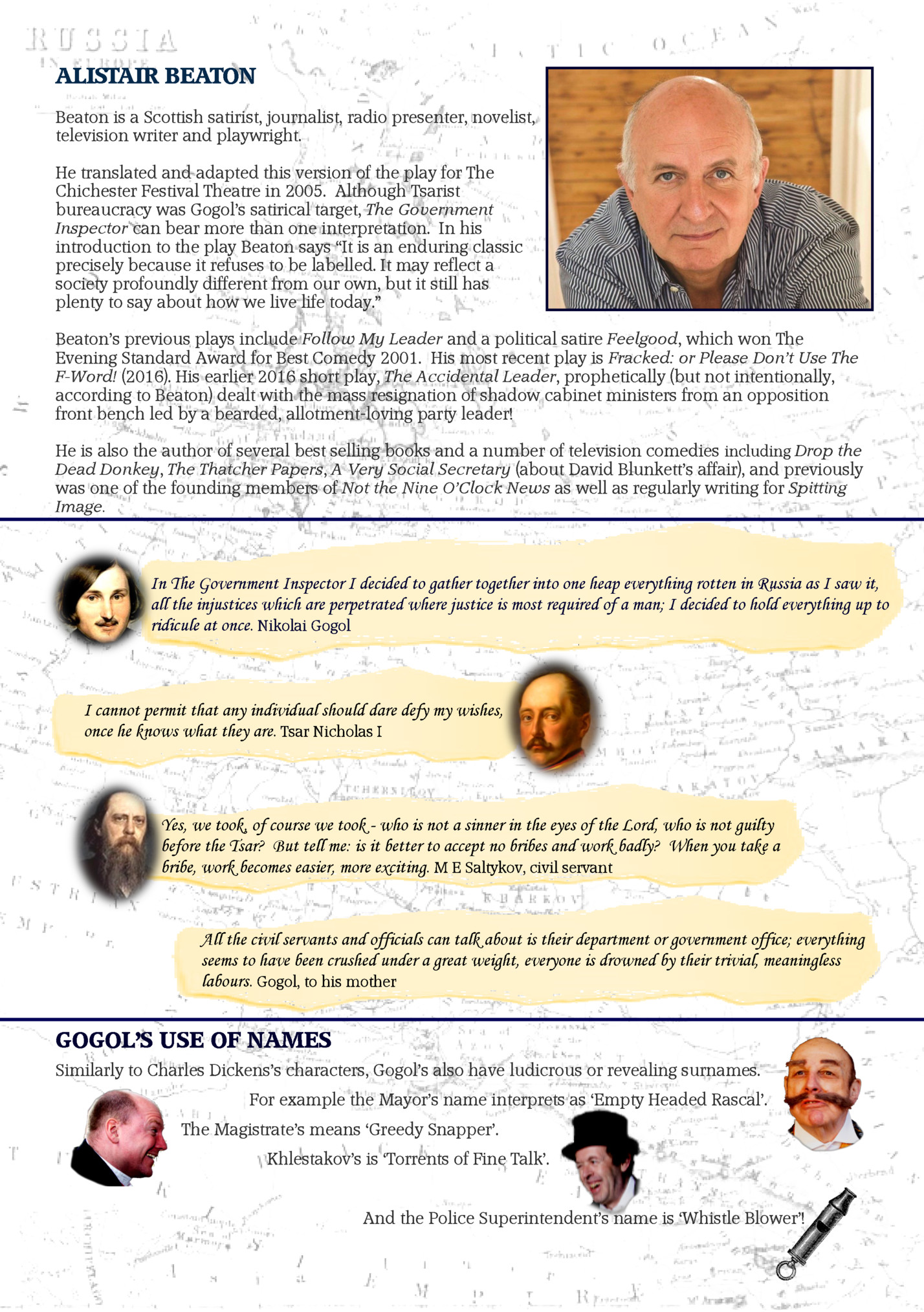
THE JOYS It can be initially unnerving for an actor stepping out onto an open-air stage in front of an audience for the first time. Usually, it’s still daylight, which means you can see them all clearly! To begin with that’s pretty scary! However, it does not take long to realise that such a strong visual connection is actually positive and invigorating, especially when you take into account that the plays which work best outdoors are bold comedies or farces (like The Government Inspector) which often call for larger-than-life characterisation supported by strong vocal and physical technique. Suddenly, the audience become complicit in the performance and there is a much greater sense of the two-way relationship that always exists between performers and audience—it’s truly a shared experience. So there is greater exposure on both sides! The audience are watching the actors but the actors are watching the audience too. So every time a cork pops or a forkful of food finds its way into somebody’s mouth, it does not go unnoticed! Once you get used to this new relationship—on both sides of the footlights (metaphorical or otherwise)—you get a fantastic community feeling and the consequence—hopefully—is that everyone goes home happy! Adam Sniptov THE TRIBULATIONS Outdoor European theatre may well have commenced in Ancient Greece but Guildburys Theatre Company has been keeping the flame burning now for thirty years. This accounts for one third of our regular programme. And, despite the challenges, we are likely to keep doing so for our foreseeable future. There is a sort of shared madness that places performers and audience together in an open space—after all, our weather is perhaps not as reliable as that generally enjoyed by the Greeks! We are not only talking about the perils of a slippery wet stage. Oh no. Sometimes, despite the power of slightly amplified sound, an unsympathetic wind will sweep words away and deposit them in some distant field corner. Or sunshine can also provide as many issues, where heavily costumed actors can find themselves blisteringly overheated, being blinded by a setting sun, or scorched and trapped on a concrete stage and surround such as at The Minack Theatre where one can frequently feel one could fry an egg. There’s also much that can potentially distract an audience. In summer even an evening performance has more light than any internal auditorium. The distraction could be your neighbour’s picnic, the popping of corks, a bee, low flying aircraft or, again at The Minack in Cornwall, the odd seal or dolphin. Indeed, when we were last at The Minack, one early evening, whilst on stage, I noticed the audience had switched their gaze to the sea behind me. I was sorely tempted to turn around myself but resisted the temptation for a few minutes until I came off stage. What I then saw was a double rainbow out to sea with a cruise ship apparently immediately underneath; above the ship hung a helicopter and from it a hoist to the ship with figures being drawn up ! It’s true ! That sort of competition just can’t be beaten! Ian Nichols GREAT RUSSIAN WRITERS OF THE 19TH CENTURY Nikolai Gogol Mikhail Lermontov Ivan Turgenev 1809-1852 1814-1841 1818-1883 Fyodor Dostevsky 1821-1881 Leo Tolstoy 1828-1910 Anton Chekhov 1860-1904 photos: Phill Griffith Alexander Pushkin 1799-1837
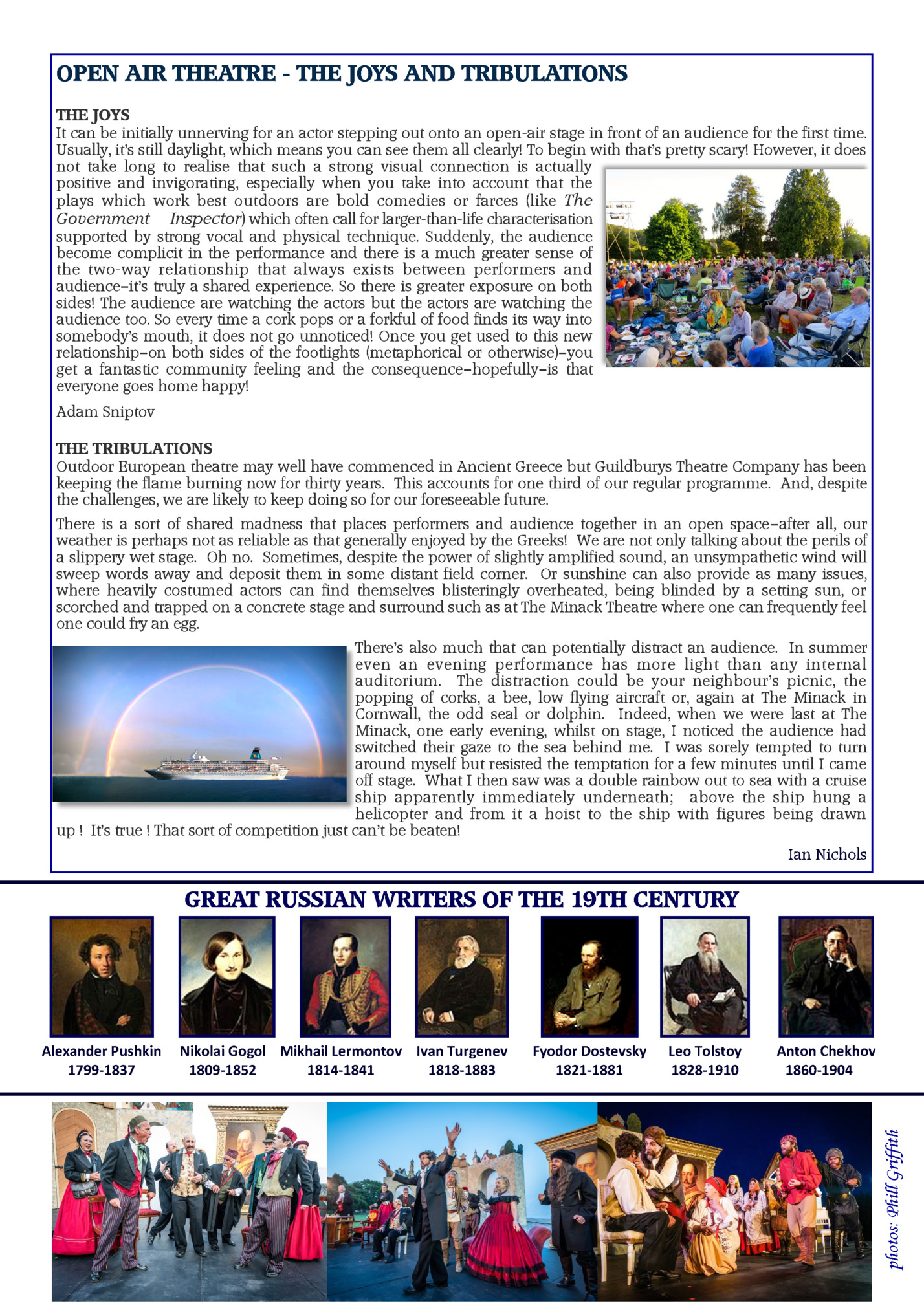
Guildburys Theatre Company staged their first production in 1963 and The Government Inspector is their 175th full scale show! In addition, there have been festival plays, music halls and entertainments of mixed provenance. Goodness knows how many hours of rehearsal have been got through... or how much alcohol has been sunk in the post-rehearsal sessions that have always been an essential part of the process! Originally, the Surrey-based company was the Guildbury Players, the name being an amalgam of the first part of Guildford and the second part of Albury, the two locations around which the group’s activities mainly centred. After about ten years, the group became Guildbury Productions but continued to be known almost universally as just Guildburys. The group’s name now reflects the importance of keywords in today’s world of the internet and search engines! But we’re still known almost universally as just Guildburys. Early shows were almost entirely musical and were usually touring productions, visiting a wide range of venues in the Guildford area. Probably the most striking aspect was that Tartuffe at the Minack, 2013 everything needed to stage a production was transported in a double decker bus! It was certainly a novel way of getting noticed! The first non-musical shows were festival entries but soon the company began to stage full-length plays. However, large-scale musicals continued to be the chief focus until the balance started to shift in the late 1970s. The last fullscale musical was Camelot in 1984, although a few more musical-based offerings were to come. Guildburys were among the first to appear at the Rhoda McGaw Theatre in Woking and at the Electric Theatre in Guildford. The company’s first open-air production was The Merchant of Venice, which toured to the Minack Theatre in 1979, but the company has continued to present outdoor ‘picnic theatre’ annually in the Farnham and Guildford areas since 1990, including many plays by Shakespeare. The Government Inspector, which was performed in July at Merrist Wood College near Guildford, is therefore the thirtieth consecutive production in the sequence! It is also our fourth production at the Minack! Full details of all shows can be found at www.guildburys.com. The Merry Wives of Windsor at the Minack, 2016 photos: Lynn Batten DIESE WOCHE………….at the Minack………….…..NEXT WEEK DER REVISOR – Zusammenfassung der Geschichte Nikolai Gogols Revisor ist eine Verwechslungskomödie: Khlestakov, ein niedriger und geldloser Beamter aus St Petersburg kommt in eine kleine Provinzstadt, wo er von den Einwohnern für einen hochrangigen Revisor der Regierung gehalten wird. Der Bürgermeister und die Würdenträger der Stadt leben in Furcht, daß das Ausmaß ihrer Korruption bloßgestellt werden könnte. Der betrügerische Bürgermeister und seine korrupten Kollegen tun alles, um sich Khlestakov gewogen zu machen und heißen ihn mit offenen Armen willkommen. Der falsche „Revisor“ nutzt das Mißverständnis weidlich aus, erfindet detailreiche Fantasien über sein Leben als hochrangiger Regierungsbeamter und akzeptiert großzügige Bestechungsgelder von den Rangträgern der Stadt. Er flirtet mit der Frau des Bürgermeisters und verlobt sich mit ihrer Tochter. Ehe seine wahre Identität bloßgestellt werden kann, flieht Khlestakov mit seinem Diener und seinen Taschen voll Geld. Die Anwohner der Stadt entdecken ihren Fehler erst als Khlestakov schon über alle Berge ist und nur kurz bevor… doch das zu erzählen, würde das Ende des Stücks verderben! Steffen Zschaler
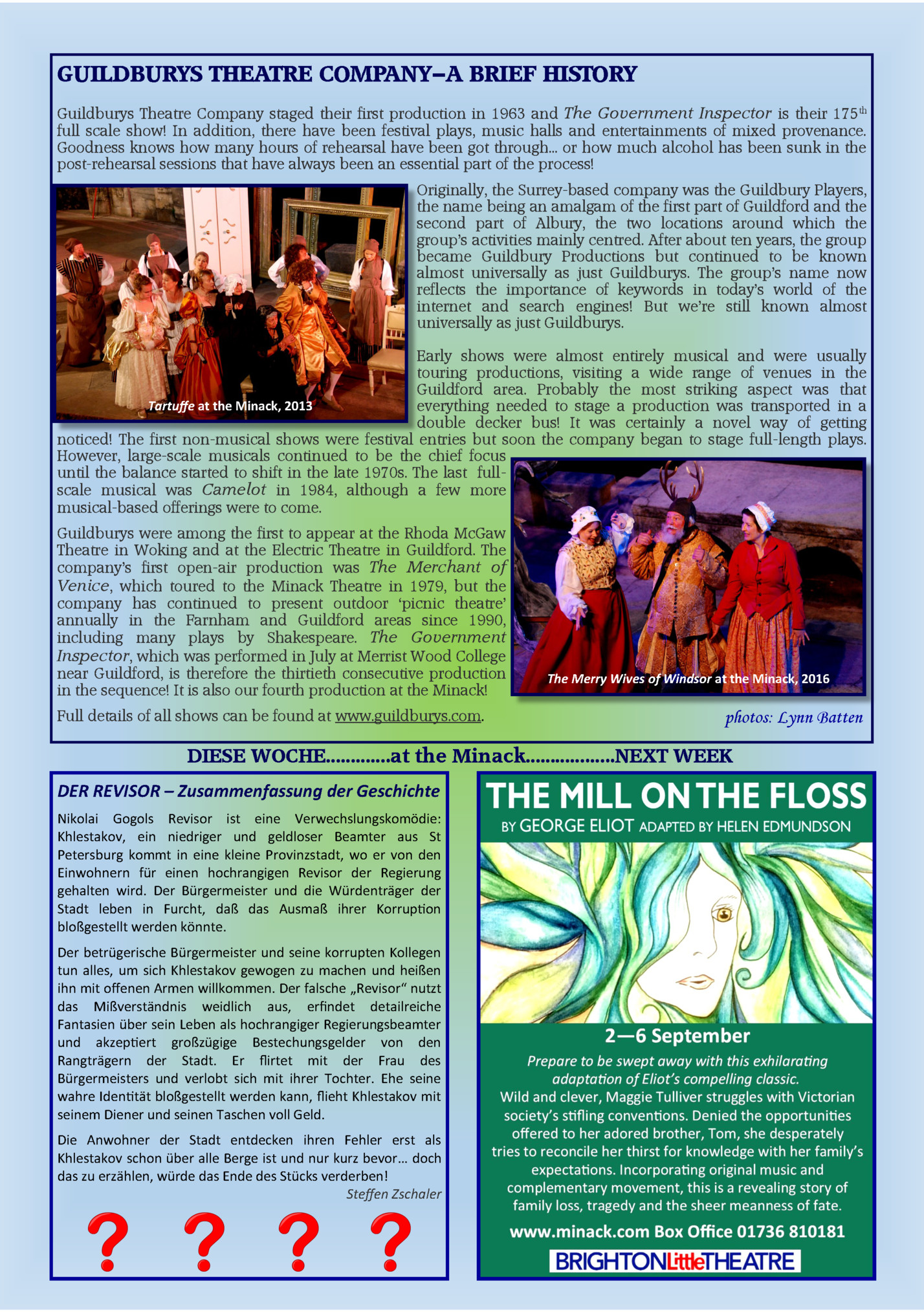
Fleepit Digital © 2021